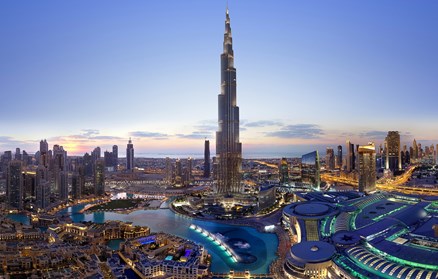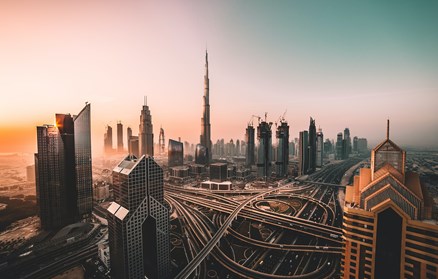e-COMMERCE
The growth of e-commerce and the ever-evolving nature of consumer behavior have altered the course of global retail faster than before in recent years, especially so since the Covid-19 pandemic. Purchasing goods electronically has become increasingly popular, forcing retailers to remodel their businesses to maintain competitiveness and efficiency.
The Middle East is continuing to experience monumental growth in e-Commerce, which is projected to be worth US $48.6 billion by 2022 . The UAE is taking a giant strides to become the fastest growing e-commerce market in the Middle East, with the local e-commerce sector set to contribute AED 12 billion to the local GDP by 2023.
In October 2019, HH Sheikh Hamdan bin Mohammed bin Rashid Al Maktoum launched the Emirate’s e-Commerce strategy that aims to strengthen Dubai's status as a global logistics platform and accelerate online commerce growth, with the goal of increasing regional and global share of e-Commerce companies in Dubai by AED 24 billion through number of simulative initiatives.
As the future of trade in the UAE is focused on digitalization, in line with the nation’s drive towards creating smart cities, the growth of e-commerce is very much part of this. Cashless payments and e-commerce are top government priorities as outlined in UAE Vision 2021. The UAE’s pivotal position on the global trade map, its large storage capacity, and its extensive logistical networks, coupled with government support, contributes to the continued growth of the sector and places the UAE at the pinnacle of the global e-Commerce industry.
Dubai in particular has become the center of the growth and innovation in the e-Commerce space in the region with several of the most pioneering e-Commerce companies sprouting up from Dubai, taking advantage of the city’s fertile ecosystem and going on to expand into the region. Success stories like e-Commerce platform Souq.com (acquired by Amazon in 2017 for US$580 Million) and rider hailer and delivery company Careem (acquired by Uber in 2019 for US$3.1 Billion) have revolutionized payment and delivery, and e-Commerce adoption in general in the region.
The e-Commerce market continues to gain momentum in the UAE, with customers today able to get their hands on a vast range of consumer goods and services, all via a tap, click or swipe on their mobile devices or computers. The increasing number of digitally perceptive UAE consumers seek on-demand, near-instant solutions and nearly 81% of the UAE’s adult population regularly purchases goods online . A young population is also contributing to eCommerce adoption with 50 percent of the total population of the UAE made up of young adults between 20-39 years old.
From the business side of things, the future looks bright with Dubai's e-commerce business boom reflected in new license applications. Despite the COVID-19 pandemic, Dubai Economy reported an 83 percent growth in DED Trader licenses issued in the first half of 2020, reflecting Dubai’s status as an e-commerce and commercial hub for both companies and consumers in the Middle East region.
Dubai CommerCity
Dubai CommerCity is an upcoming Free Zone dedicated to support the growth of the e-Commerce market in the region. It provides a unique e-Commerce ecosystem to global and regional brands to help them set up and operate their e-Commerce business across the Middle East. The Free Zone, which is a joint venture between Dubai Airport Free Zone Authority (DAFZA) and Wasl Asset Management Group, is 2.1 million square feet in size and is split into three clusters: business, logistics, and social. The business cluster will accommodate 12 office buildings that promise modern facilities and sustainable design for companies of varying sizes. Tenants will benefit from a ‘one-stop shop’ of support services including immigration, healthcare, administration, and banking, and will also be able to make use of the logistics cluster, consisting of heavily automated AI-powered warehouses.
EZDubai e-Commerce Zone at Dubai South
The establishment of EZDubai, a fully dedicated e-Commerce zone located at the heart of the Logistics District in Dubai South has bridged the gap in e-commerce, not only in Dubai but in the GCC as a whole. The ultra-modern infrastructure, regulatory framework, connectivity and ease in logistics are phenomena that will position the UAE as the epitome of the global e-Commerce industry. e-Commerce is set to contribute AED 12 billion to the local GDP by 2023 and having a fully-fledged operational facility like EZDubai demonstrates the ability of the region to manage and facilitate this growth. With seamless, multi-modal connectivity between road, air and sea transportation, the Logistics District has streamlined customs processes with an on-site licensing and visa authority.
Additionally, the zone provided optimal solutions and unparalleled access to cross-continental distribution networks, extending its reach to the high-growth markets of the Middle East, Africa and South Asia (MEASA) region. In its first phase of operation, EZDubai spans 340,000 square metres, 68,000 square meters of which is operational, and an additional 91,000 square meters under development. It will feature e-fulfilment centers, infrastructure for repair and return centers, supply centers, and buildings for offices as part of the zone’s masterplan. Companies operating from EZDubai include DHL Express, Aramex, Amazon, Noon,Yunda, First cry, Triboo LLG and more.







